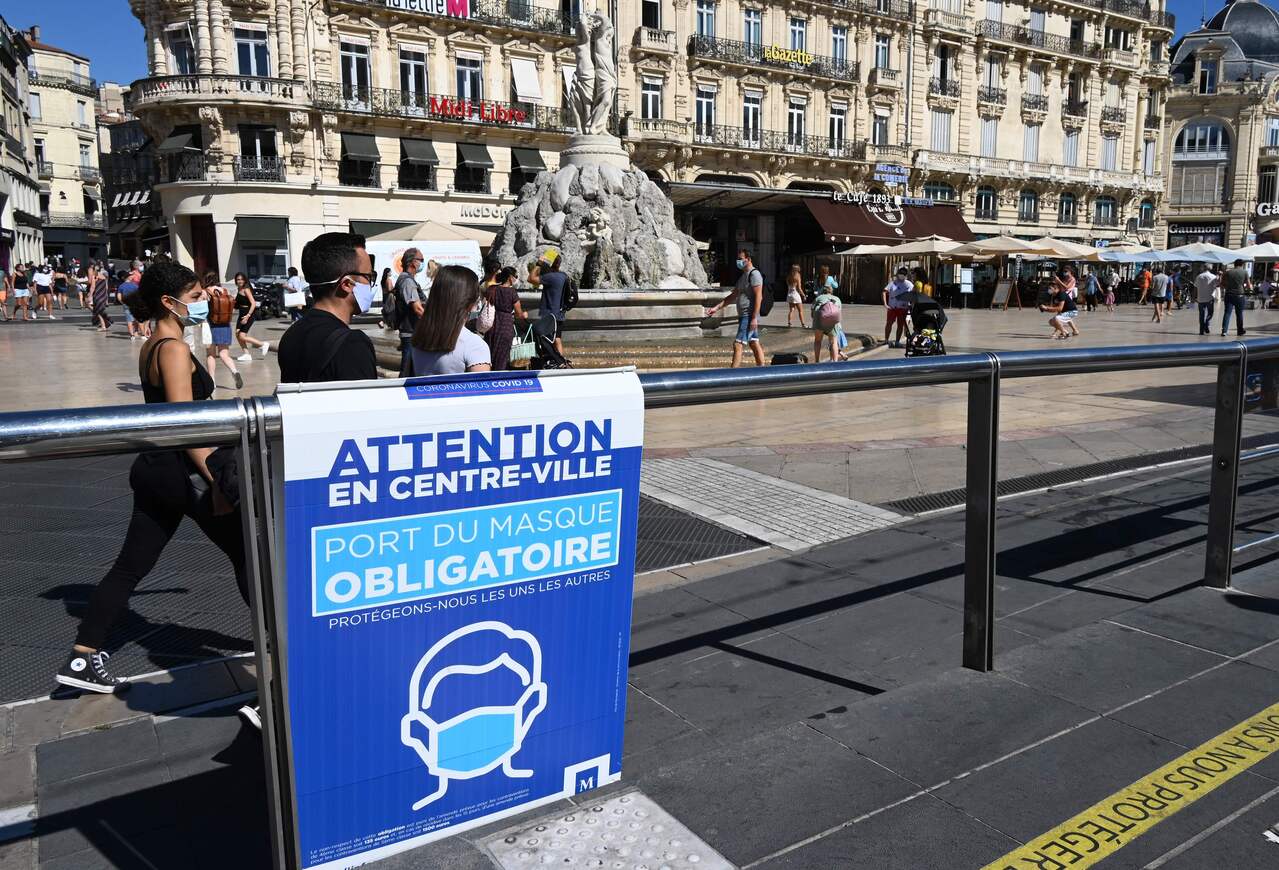France says it must move fast to fight coronavirus surge but lockdown is last resort
Sign up now: Get ST's newsletters delivered to your inbox

People walk next to a billboard reading "Mandatory mask in downtown Montpellier", on Aug 25, 2020.
PHOTO: AFP
Follow topic:
PARIS (BLOOMBERG, REUTERS) - France is ready to institute a new national lockdown as a last resort as Europe grapples with how to contain the resurgent coronavirus.
Plans to restrict movement are ready, but the country will do everything possible to avoid measures that clobbered the economy in the second quarter, France's Prime Minister Jean Castex said on Thursday (Aug 27).
Italy and Spain have also rejected stringent national lockdowns, while top German politicians quarrelled over how to combat the resurgent coronavirus.
"The epidemic is gaining ground, and we need to intervene now," Castex said, rejecting the need for broad restrictions. "This doesn't mean the situation is as serious as it was" earlier this year.
But he cautioned: "The virus is spreading all over the country."
"The spread of the epidemic can be exponential if we do not react quickly," he told reporters.
The virus's reproduction level has jumped, with infections surging in the Paris region and among young people. France's Covid-19 reproduction "R" number is now 1.4, Castex told a news briefing, indicating that the overall epidemic is growing.
Grandparents are being told not to pick up their grandchildren from school as the government is worried about hospitals being overwhelmed.
The health ministry on Wednesday reported 5,429 new daily infections, a new post-lockdown high and a level of new infections not seen since the height of the epidemic in early April.
The government is due to unveil details of the post-pandemic rescue plan to haul the G7 economy out of its deepest slump since World War Two on Sept 3.
Europe's leaders are struggling with how to respond to the latest developments in the pandemic, wary of sweeping measures that could hobble recovering economies.
There's little appetite for harsh lockdowns, as current data indicate the outbreak is becoming less deadly - at least for now.
"Another lockdown would create incalculable risks for companies and snap the chains of value creation," Dieter Kempf, president of Germany's BDI industry lobby, said on Twitter.
Tensions over how to counter the latest rise in cases rose to the surface in Germany. Ahead of a video conference between Chancellor Angela Merkel and state leaders to discuss the pandemic, Bavaria Premier Markus Soeder called out Health Minister Jens Spahn.
Spahn announced this week that arrivals from risk areas will have to enter a 14-day quarantine, which can be ended after five days if a negative test result is provided. Due to a lack of capacity, a requirement for people to be tested on arrival will be scrapped.
Soeder called the decision "at the very least hasty" and questioned whether quarantine works in practice. Germany is struggling to define a national strategy as some state leaders point to low infection rates locally. That's created tensions over how to handle the latest upsurge.
At the meeting, Merkel wants state governments to refrain from further loosening steps and impose a fine of at least 50 euros (S$81) on people who don't abide by face-mask rules, news agency DPA reported, citing a draft of the proposal. The country also aims to extend a ban on large events such as festivals and concerts until at least the end of 2020, according to DPA.
France's new restrictions are to be targeted at specific locations, where contagion rates are more intense, such as Paris.
Marseille, France's second largest city, has made masks mandatory everywhere and bars and restaurants have to close by 11 pm. Local authorities were better placed to propose measures to contain the spread and react to specific outbreaks, Castex said, adding that he's pushing for local authorities to tighten mask rules in Paris and the capital's suburbs.
The approach is similar in Spain.
Prime Minister Pedro Sanchez said Tuesday (Aug 25) that another lockdown is not on the table, putting the response in the hands of regional authorities. Spain, the epicentre of the pandemic in Europe, recorded 3,594 infections, close to a four-month high. Italy registered 1,367 new coronavirus cases on Wednesday, the most since May 12.
In Germany, there were 1,431 new cases in the 24 hours through Thursday morning, still well below the peak of nearly 7,000 at the end of March and in early April.
Across Europe, outbreaks since mid-July have been fuelled by summer-time social gatherings and lax social distancing among young adults. Many of the new cases in Italy involve younger vacationers returning either from within the country or from abroad.
While the number of hospitalised and deaths has remained well below the levels seen during the pandemic peak in spring, the concern is that the disease hits more elderly and other vulnerable people in the coming weeks.
Italy, which is also ruling out a new national lockdown, stepped up testing in ports and airports for arrivals from at-risk countries, with a record 93,529 tests carried out on Wednesday.
It has already closed nightclubs and tightened rules on mask wearing. After avoiding severe spikes, "I hear people say that Italy is a model, but I am very cautious," Health Minister Roberto Speranza said in an interview on Wednesday. "We still have much to do. God forbid people should think that the battle has been won."

